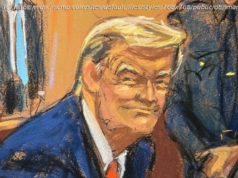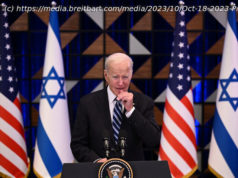Sebastian Kurz rode to victory raising concerns about Europe’s migrant crisis, framing his party as more palatable than far-right.
Sebastian Kurz, Austria’s telegenic 31-year-old foreign minister, is set to become the nation’s next chancellor and the youngest leader in the European Union.
Returns from Sunday’s parliamentary election show that Kurz’s right-leaning People’s Party had pulled a commanding lead over the far-right Freedom Party and the center-left Social Democrats.
Kurz, a Millennial from Vienna known for his slicked-back, dark hair and promises to curb immigration to Austria by mostly Muslim migrants, became foreign minister in 2013 at the age of 27.
Now, he’s on the path to come to power younger than French President Emmanuel Macron, 39. He’d also be junior to North Korea leader Kim Jong Un, who is believed to be 33. And with his calls for tougher immigration rules, Kurz also effectively pushed his once center-right People’s Party further to the political right.
«It is my assignment to change this country,» Kurz said as he declared victory Sunday evening. «I will establish a new style in our country.”
Nearly completed returns show Kurz’s party receiving 31.4% of the vote, with the far-right Freedom Party coming in second with 27.4%. The center-left Social Democrats, who now govern in coalition with the People’s Party, got 26.7%.
A coalition will likely be formed by the People’s and Freedom parties to form a government, meaning a decided turn to the right for Austria.
Kurz took a hard line on immigration during the campaign — an issue that came front-and-center after the country of more than 8.7 million absorbed about 90,000 migrants, most fleeing civil war in Syria, in 2015.
On the stump, Kurz made the case for curbing benefits for new arrivals, and requiring that immigrants learn German. He also consistently reminded voters that he opposed opening the borders during the 2015 migrant crisis and has vowed to slash the red tape of Austria’s bureaucracy.
In early 2016, Kurz negotiated a deal between Austria and several Eastern European countries that led to closing the migration route through the Balkans. After the move, the number of refugees arriving dropped dramatically.
He took over as his party’s leader in May and quickly sought to rebrand it as “something new,” despite the People’s Party being the center-right establishment party in Austria for decades.
Under his leadership, the People’s Party has tacked right — some say co-opting the far-right Freedom Party’s fervent anti-immigrant platform, but presenting its ideas in a more palatable way.
The Freedom Party was started more than 60 years ago by former Nazis and has attracted members of the neo-Nazi fringe and has been criticized for its harsh rhetoric about migrants.
While Kurz is expected to invite the Freedom Party to form a coalition to run Austria’s next government, he avoided the inflammatory rhetoric of the right-wing party and its leader, Heinz-Christian Strache.
The more measured tone of Kurz’s party perhaps made it appealing to voters concerned about the influx of immigrants and asylum seekers, but uncomfortable with the neo-Nazi fringe attracted to the Freedom Party.
In his push for migrants to adapt to Austrian culture, Kurz has supported Austria’s new “burqa ban” law, which prohibits wearing a full face veil in public as worn by some Muslim women. He also pledged to close Islamic nurseries.
Austria’s next chancellor is an avid windsurfer and hiker.
Kurz, who is not married, went to the polls in Vienna on Sunday with his girlfriend Susanne Thier, a finance ministry worker he reportedly first met when he was 18, by his side.






